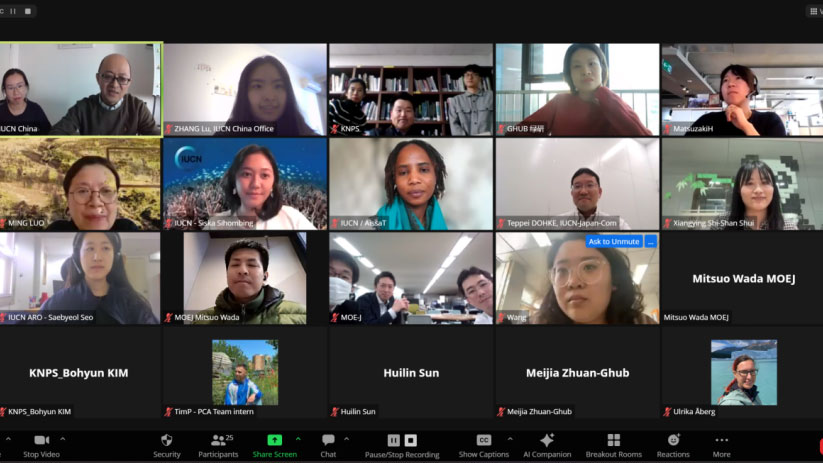Advancing Biodiversity Conservation: IUCN-Republic of Korea Global Red List Partnership Completes Successful Project
The IUCN-Republic of Korea Global Red List Partnership (a collaboration under the Republic of Korea-IUCN Framework Partnership 2017-2020) has successfully concluded its three-year project, running from September 2020 to September 2023, aimed at coordinating global Red List assessments in the Republic of Korea (ROK). Facilitated by the International Union for Conservation of Nature (IUCN), the collaboration focused on achieving an up-to-date state of biodiversity for ROK's endemic species through national coordination, capacity building, Red List assessments, and species conservation planning.
Objectives and achievements:
The project had multifaceted objectives, including creating a coordinated national Red List assessment process, contributing to the IUCN's Barometer of Life, providing technical support to ROK's national Red List Committee, and undertaking an in-depth conservation planning process for three priority species.
The Red Listing component, led by the IUCN Red List Unit and the National Institute of Biological Resources (NIBR) of the Ministry of Environment (MoE) of Republic of Korea, involved crucial activities such as Red List training workshops, engaging with IUCN SSC Specialist Groups, and producing 189 assessments of ROK's native species on the IUCN Red List. The collaboration resulted in the creation of additional draft assessments, distribution maps for endemic species, and concise status reports on assessed seaweeds, freshwater fish, freshwater invertebrates, and terrestrial invertebrates.
- Assessed seaweeds: a total of 24 seaweed/algae species were identified for assessment during the course of the project, and all species have been assessed for the global Red List as a result of this. They come from a wide taxonomic scope with Red Algae (Cerimales, 14 species; Gelidales, 5 species; Acrochaetiales, one species), Brown Algae (Ectocarpales, two species; Laminariales, one species), and Green Algae (Bryopsidales, one species) all represented.)
- Assessed freshwater fish: of the 21 endemic species assessed, 11 (52.4%) were assessed as threatened (i.e. Critically Endangered [one species], Endangered [four species] or Vulnerable [six species]).
- Assessed freshwater invertebrates: of the 28 endemic species assessed, five (17.9%) were assessed as threatened (IUCN Red List Categories Critically Endangered (CR), Endangered (EN), and Vulnerable (VU)). And
- Assessed terrestrial invertebrates (One of the endemic species was considered to be Extinct (Coreoblemus parvicollis). Of the remaining 64 endemic species, seven (10.9%) were assessed as threatened (one Critically Endangered, five Endangered and one Vulnerable).
The Single Species Conservation Planning component coordinated by the IUCN Species Conservation Action Team and the Korean National Institute of Ecology (NIE), facilitated conservation planning workshops and produced three comprehensive conservation action plans for priority species: the Korean Stumpy Bullhead fish, the Seoul Pond Frog, and the Oriental Stork.
Successes and lessons learned:
The project fostered successful collaboration between IUCN, NIBR, NIE, and the IUCN SSC network including the Conservation Planning Specialist Group (CPSG). The collaboration not only resulted in tangible outputs but also provided capacity building in red listing and species conservation planning. Although the project started with online workshops, despite challenges posed by the COVID-19 pandemic, the project achieved its goals and laid the foundation for more red listing and species conservation planning work in ROK.
Lessons learned emphasized the effectiveness of in-person workshops for both Red List training and review, and species conservation planning, as well as the importance of engaging diverse stakeholders, continued collaboration between IUCN and ROK’s Institutions, awareness raising on species conservation planning and action. This project also highlights the importance of national level species conservation status assessment, planning and implementation. Republic of Korea sets a good example of using holistic conservation approaches for the implementation of the Kunming-Montreal Global Biodiversity Framework.
Towards future conservation:
The collaboration between IUCN, Republic of Korea's Ministry of Environment, National Institute of Biological Resources, and National Institute of Ecology has significantly contributed to Republic of Korea's and global biodiversity conservation efforts. The success of this project is anticipated to pave the way for follow-up projects to build on its achievements, continuing the momentum for the conservation of Republic of Korea's unique and threatened species.



